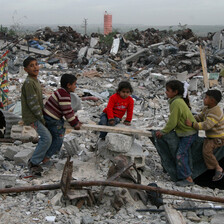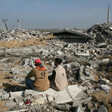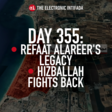The Electronic Intifada 7 May 2014

From left to right, Gaza writers Rawan Yaghi, Refaat Alareer and Yousef Aljamal with Sarah Ali’s cardboard stand-in, on their recent US tour.
Last December, I was invited to take part in a speaking tour in the United States about Gaza Writes Back, a book to which I contributed.
The book is an anthology of 23 short stories written by young Palestinians commemorating, in fiction, the fifth anniversary of Israel’s 2008-2009 attack on Gaza, known as “Operation Cast Lead.”
There was no hesitation. No second thoughts. “Yes! Of course,” I promptly wrote back to Refaat Alareer, the book’s editor. The three-week tour started on 1 April and included cities across the US. But, sadly, I did not make it, and I was not part of the tour.
There is, of course, the furious patriot inside me that wanted to tell Americans about their tax money helping Israel kill my people; there are stories that I wanted to tell about Palestine and Gaza.
I wanted to raise awareness about the injustice inflicted upon the Palestinians. But there is also the sardonic Gaza citizen who simply wanted to escape all of this for a while, and who just wanted to travel and have a good time (and visit Central Perk, the coffee shop in the US TV sitcom Friends).
I wrote down the names of the books I didn’t find in Gaza and wanted to look for in the US. My family gave me a list of things to buy from the States, and I had many American friends I knew from the Internet for years and who I was finally going to meet in person. I had big plans, and since I lived most of my life in Gaza, I was sincerely grateful to be offered such an opportunity.
Bursting with excitement
But first, I had to apply for a US visa. To my surprise, I was given a one-day Israeli permit to go to the United States Consulate in Jerusalem for the visa interview.
Visiting Jerusalem was a surreal experience to which no piece of writing can do justice.
Even though traveling through the Erez crossing from Gaza into present-day Israel was tiring and psychologically humiliating, the trip was emotional and uplifting, especially because it was my first time outside Gaza in fifteen years.
Two weeks after the interview, I got my passport back with the US visa. I was one step closer to being in Amriiikka (that’s exactly how we say it in Arabic). I was bursting with excitement.
I was quite aware what a visit like this would do for me, for my personal growth and intellectual development as a young Palestinian academic. Meeting all those people I interact with on Twitter and Facebook would affect me beyond imagination and would help me acquire more perspective on the struggle against injustice as well as the activities on American campuses.
Coming face to face with Palestinians in the diaspora and meeting Palestinian solidarity activists would be invaluable experiences.
Permit denied
With my visa in hand, now all I had to do was travel. But getting out of Gaza is not easy. With the escalation of the political crisis in Egypt, the Egyptian coup government has tightened its grip on the Rafah crossing, which has been open for just twelve days this year to a tiny number of patients and students.
I was not even able to register to travel through Rafah because there were hundreds still waiting on the list to travel before the Palestinian interior ministry in Gaza could accept new registrations.
Rafah was hopeless. So having already got an Israeli permit to travel to occupied Jerusalem for the visa interview, I thought it would not be impossible to get another permit so I could travel through Erez to Jordan and then fly from Amman to the US.
The American Friends Service Committee, the organization sponsoring the book tour, helped me apply for a permit. After almost a month waiting for a decision, I was told my application was rejected. Then there came this point in my life where, having failed to travel abroad three times in less than one year, it dawned on me that maybe traveling is something I can only dream of and plan for but never actually do.
The reason the Israeli authorities gave for denying me a permit is that I did not belong to any of the categories normally allowed to travel through Erez. From what I have seen, those include patients getting treatment in Israel, merchants who import goods from Israel into Gaza, foreign journalists and individuals or delegations traveling within US consulate-sponsored programs.
Other than that, the decisions as to who is allowed to travel and who is not seem to be so annoyingly random. In fact, one of the most irritating things about occupation is its randomness.
One day they allow you into Israel and then the next day you are a security threat. One day the officer is in a good mood so he thinks you are a nice Palestinian but the next day you are a “khamas” terrorist. One day they help you go to a visa interview and the next day they stop you from actually using this visa.
“Security”
My jaw dropped at Erez crossing when I saw an Israeli officer run a very small machine over an empty pottery bowl which belonged to a Palestinian woman — “What are you checking exactly? It’s freaking empty!” I thought to myself.
Israel’s “security concerns” about Gazans traveling through Erez sound like a ridiculous joke, especially when suicide bombings decreased and then stopped years ago more because of a change in strategy by Palestinian armed groups than because of Israel’s restrictions on travel. Looking at casualty figures, no one can deny that it is overwhelmingly Palestinians who are the victims of violence whose source is Israel. Yet “security” is the constant justification.
I often hear Zionists smugly say things like, “Why don’t you ask Egypt to let you travel?” as though Egypt’s shameful complicity justifies Israel’s siege on Gaza or changes the fact it is Israel’s sole responsibility that we cannot travel directly from Gaza as Israel bombed our only airport repeatedly.
There is no doubt that Gaza Writes Back is a pro-Palestinian book. It is a Palestinian book. Anyway, I think the facts are inherently pro-Palestinian. But there are stories in the book about Israelis as well, highlighting the fact that occupation might sometimes be just as harmful for the occupiers as it is for the occupied.
There is a story about a Palestinian who, having as a child seen his brother shot right in front of him, grows up to eventually blow himself up in an Israeli park full of soldiers, one of whom is a beautiful female soldier who could have become his wife in a different world.
There is a story about an Israeli soldier who is haunted by the memories of war, and another story about two farmers, one Palestinian and the other Israeli, on the two sides of the apartheid wall in the West Bank.
What about dialogue?
The book itself and the speaking tour came as a peaceful and creative initiative intended to promote dialogue and mutual understanding. And though I am no supporter of the “peace talks” between the Palestinian Authority and Israel — which have proven futile and a waste of time over and over again — I did accept the invitation and was ready to talk to and argue with pro-Israel individuals, something very much expected when you want to speak to an American audience.
Israeli leaders make the bogus claim that they are fighting “terrorism” (except they don’t consider their own white phosphorous bombs, drones, F-16 fighter jets and Apache helicopters to be “terrorist”) and want to achieve peace with Palestinians through dialogue and negotiations. Yet, ironically, when ordinary Palestinians ask for a permit to travel and dialogue, they are faced with apathy, distrust and rejection.
Could it be that Israel just doesn’t want the world to hear directly from Palestinians — especially those trapped in Gaza?
Israel leaves us with few options. As long as all Palestinians, including writers, artists, journalists and academics, are denied basic human rights, Israeli institutions that profit from or support the occupation and siege should be boycotted.
Until equal rights are given to all people living in historic Palestine, regardless of race, color or religion, Israel’s oppression should be fought and its racist policies challenged.
Luckily, three of my friends — editor Refaat Alareer and contributors Yousef Aljamal and Rawan Yaghi — did make it to the US for the tour.
They were already out of Gaza studying in Malaysia and the UK before the tour started (just imagine if the four of us were all in Gaza), so it was relatively easy for them to travel to the US.
Locked up
I watched some of their talks online: they were moving, funny and inspiring. Rawan read an extract from the story I contributed to the book. They had a poster with a silhouette of me and the words “Sarah Ali should be here” inscribed on it at all their events.
Sometimes when I recall the procedures I followed while applying for the visa and waiting for the permit, each step long and onerous, I console myself by thinking, “Well, at least you had a cardboard stand-in with your name on it roaming America. It might have passed by Central Perk.”
I used to think that calling Gaza “the largest open-air prison” was hyperbolic, but recently I started to believe it might just be the perfect description. Every day, there are hundreds of Palestinians stuck in Gaza.
There are students who fear losing their scholarships abroad, people who want to visit their families in the West Bank or abroad, families who risk their residency in the Gulf or European countries if they stay in Gaza longer than they plan to, pilgrims who want to travel to Mecca, and people who want to travel for fun — a very legitimate reason to travel.
Freedom of movement is a human right. No civilian population should be locked up like this. Nobody should have to think of borders a hundred times before they consider traveling or booking a ticket. Nobody should have to live at the mercy of occupation.
Sarah Ali is a 22-year-old Palestinian living in Gaza. She studied English Language and Literature and is currently a teaching assistant at the Islamic University of Gaza. Follow Sarah on Twitter @Saritah_91.



